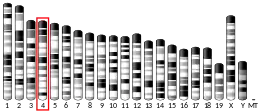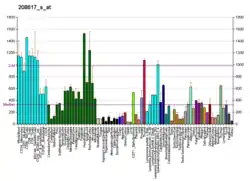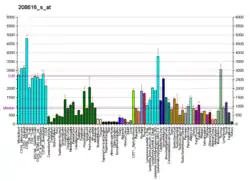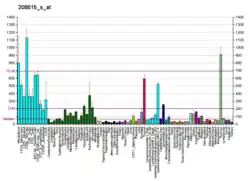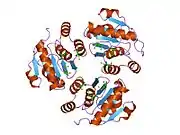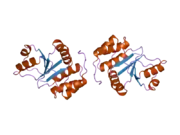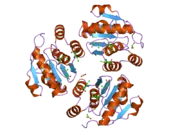PTP4A2
Protein tyrosine phosphatase type IVA 2 is an enzyme that in humans is encoded by the PTP4A2 gene.[5][6][7]
The protein encoded by this gene belongs to a small class of the protein tyrosine phosphatase (PTP) family. PTPs are cell signaling molecules that play regulatory roles in a variety of cellular processes. PTPs in this class contain a protein tyrosine phosphatase catalytic domain and a characteristic C-terminal prenylation motif.
This PTP has been shown to primarily associate with plasmic and endosomal membrane through its C-terminal prenylation. This PTP was found to interact with the beta-subunit of Rab geranylgeranyltransferase II (beta GGT II), and thus may function as a regulator of GGT II activity.
Overexpression of this gene in mammalian cells conferred a transformed phenotype, which suggested its role in tumorigenesis. Alternatively spliced transcript variants that encode two distinct isoforms have been described.[7]
References
- GRCh38: Ensembl release 89: ENSG00000184007 - Ensembl, May 2017
- GRCm38: Ensembl release 89: ENSMUSG00000028788 - Ensembl, May 2017
- "Human PubMed Reference:". National Center for Biotechnology Information, U.S. National Library of Medicine.
- "Mouse PubMed Reference:". National Center for Biotechnology Information, U.S. National Library of Medicine.
- Zhao Z, Lee CC, Monckton DG, Yazdani A, Coolbaugh MI, Li X, Bailey J, Shen Y, Caskey CT (Sep 1996). "Characterization and genomic mapping of genes and pseudogenes of a new human protein tyrosine phosphatase". Genomics. 35 (1): 172–81. doi:10.1006/geno.1996.0336. PMID 8661118.
- Zeng Q, Hong W, Tan YH (Apr 1998). "Mouse PRL-2 and PRL-3, two potentially prenylated protein tyrosine phosphatases homologous to PRL-1". Biochem Biophys Res Commun. 244 (2): 421–7. doi:10.1006/bbrc.1998.8291. PMID 9514946.
- "Entrez Gene: PTP4A2 protein tyrosine phosphatase type IVA, member 2".
Further reading
- Rommens JM, Durocher F, McArthur J, et al. (1996). "Generation of a transcription map at the HSD17B locus centromeric to BRCA1 at 17q21". Genomics. 28 (3): 530–42. doi:10.1006/geno.1995.1185. PMID 7490091.
- Montagna M, Serova O, Sylla BS, et al. (1996). "A 100-kb physical and transcriptional map around the EDH17B2 gene: identification of three novel genes and a pseudogene of a human homologue of the rat PRL-1 tyrosine phosphatase". Hum. Genet. 96 (5): 532–8. doi:10.1007/bf00197407. PMID 8529999. S2CID 24567366.
- Cates CA, Michael RL, Stayrook KR, et al. (1997). "Prenylation of oncogenic human PTP(CAAX) protein tyrosine phosphatases". Cancer Lett. 110 (1–2): 49–55. doi:10.1016/S0304-3835(96)04459-X. PMID 9018080.
- Gjörloff-Wingren A, Saxena M, Han S, et al. (2000). "Subcellular localization of intracellular protein tyrosine phosphatases in T cells". Eur. J. Immunol. 30 (8): 2412–21. doi:10.1002/1521-4141(2000)30:8<2412::AID-IMMU2412>3.0.CO;2-J. PMID 10940933.
- Hartley JL, Temple GF, Brasch MA (2001). "DNA cloning using in vitro site-specific recombination". Genome Res. 10 (11): 1788–95. doi:10.1101/gr.143000. PMC 310948. PMID 11076863.
- Si X, Zeng Q, Ng CH, et al. (2001). "Interaction of farnesylated PRL-2, a protein-tyrosine phosphatase, with the beta-subunit of geranylgeranyltransferase II". J. Biol. Chem. 276 (35): 32875–82. doi:10.1074/jbc.M010400200. PMID 11447212.
- Wang Q, Holmes DI, Powell SM, et al. (2002). "Analysis of stromal-epithelial interactions in prostate cancer identifies PTPCAAX2 as a potential oncogene". Cancer Lett. 175 (1): 63–9. doi:10.1016/S0304-3835(01)00703-0. PMID 11734337.
- Wang J, Kirby CE, Herbst R (2003). "The tyrosine phosphatase PRL-1 localizes to the endoplasmic reticulum and the mitotic spindle and is required for normal mitosis". J. Biol. Chem. 277 (48): 46659–68. doi:10.1074/jbc.M206407200. PMID 12235145.
- Strausberg RL, Feingold EA, Grouse LH, et al. (2003). "Generation and initial analysis of more than 15,000 full-length human and mouse cDNA sequences". Proc. Natl. Acad. Sci. U.S.A. 99 (26): 16899–903. doi:10.1073/pnas.242603899. PMC 139241. PMID 12477932.
- Pathak MK, Dhawan D, Lindner DJ, et al. (2003). "Pentamidine is an inhibitor of PRL phosphatases with anticancer activity". Mol. Cancer Ther. 1 (14): 1255–64. PMID 12516958.
- Werner SR, Lee PA, DeCamp MW, et al. (2004). "Enhanced cell cycle progression and down regulation of p21(Cip1/Waf1) by PRL tyrosine phosphatases". Cancer Lett. 202 (2): 201–11. doi:10.1016/S0304-3835(03)00517-2. PMID 14643450.
- Gerhard DS, Wagner L, Feingold EA, et al. (2004). "The status, quality, and expansion of the NIH full-length cDNA project: the Mammalian Gene Collection (MGC)". Genome Res. 14 (10B): 2121–7. doi:10.1101/gr.2596504. PMC 528928. PMID 15489334.
- Wiemann S, Arlt D, Huber W, et al. (2004). "From ORFeome to biology: a functional genomics pipeline". Genome Res. 14 (10B): 2136–44. doi:10.1101/gr.2576704. PMC 528930. PMID 15489336.
- Mehrle A, Rosenfelder H, Schupp I, et al. (2006). "The LIFEdb database in 2006". Nucleic Acids Res. 34 (Database issue): D415–8. doi:10.1093/nar/gkj139. PMC 1347501. PMID 16381901.
- Gregory SG, Barlow KF, McLay KE, et al. (2006). "The DNA sequence and biological annotation of human chromosome 1". Nature. 441 (7091): 315–21. Bibcode:2006Natur.441..315G. doi:10.1038/nature04727. PMID 16710414.
- Radke I, Götte M, Kersting C, et al. (2006). "Expression and prognostic impact of the protein tyrosine phosphatases PRL-1, PRL-2, and PRL-3 in breast cancer". Br. J. Cancer. 95 (3): 347–54. doi:10.1038/sj.bjc.6603261. PMC 2360632. PMID 16832410.
- Dumaual CM, Sandusky GE, Crowell PL, Randall SK (2007). "Cellular localization of PRL-1 and PRL-2 gene expression in normal adult human tissues". J. Histochem. Cytochem. 54 (12): 1401–12. doi:10.1369/jhc.6A7019.2006. PMC 3958126. PMID 16957164.
- Ewing RM, Chu P, Elisma F, et al. (2007). "Large-scale mapping of human protein-protein interactions by mass spectrometry". Mol. Syst. Biol. 3 (1): 89. doi:10.1038/msb4100134. PMC 1847948. PMID 17353931.


